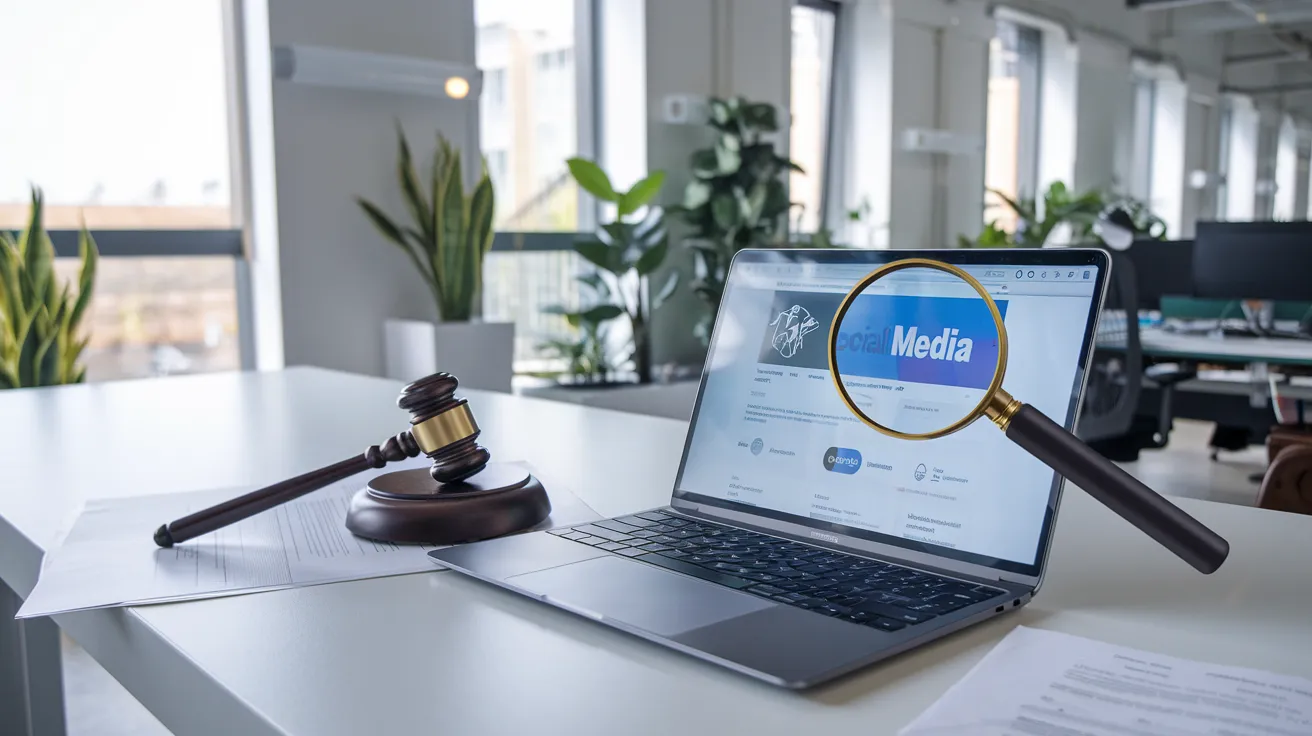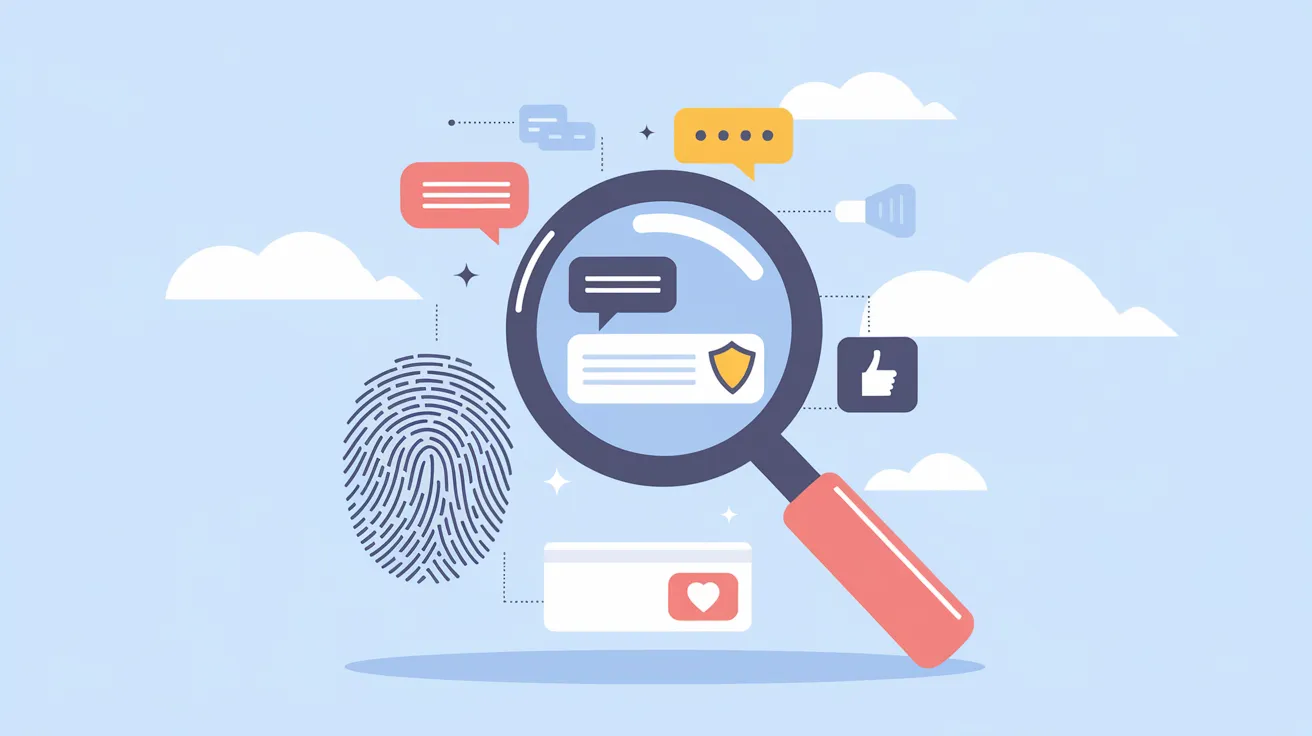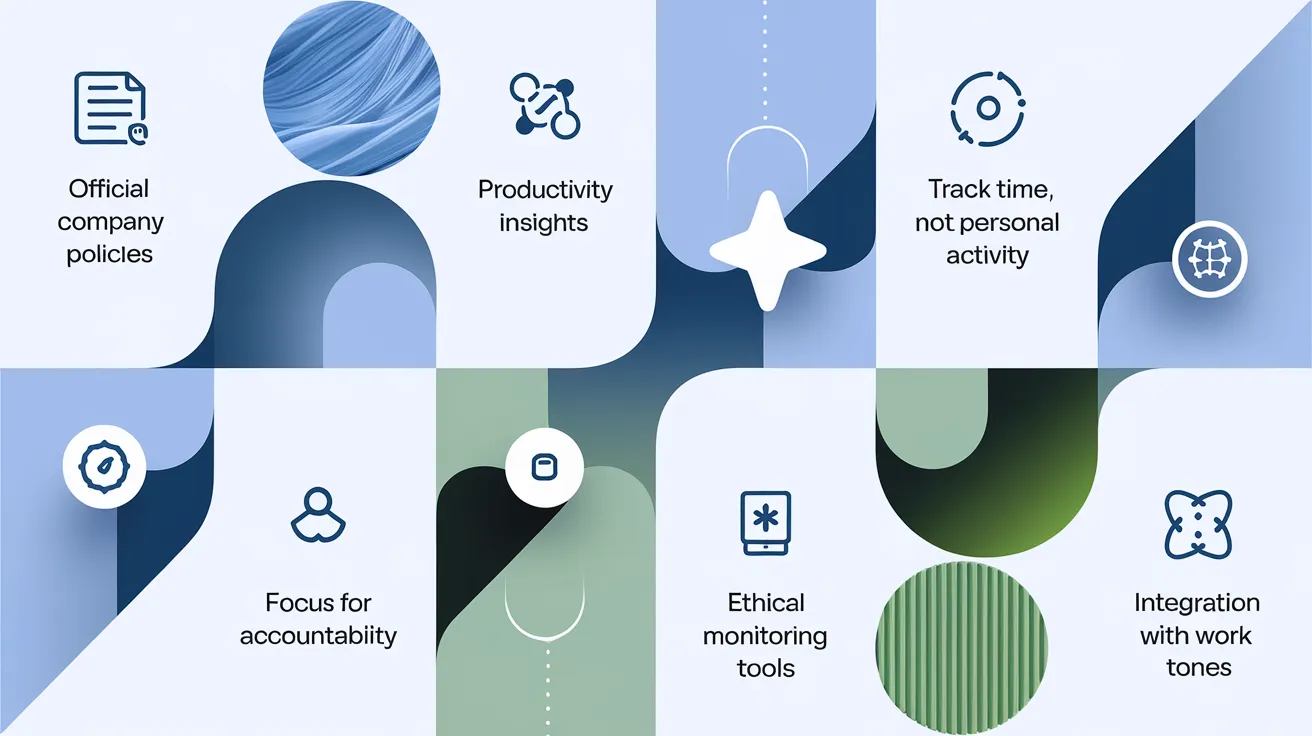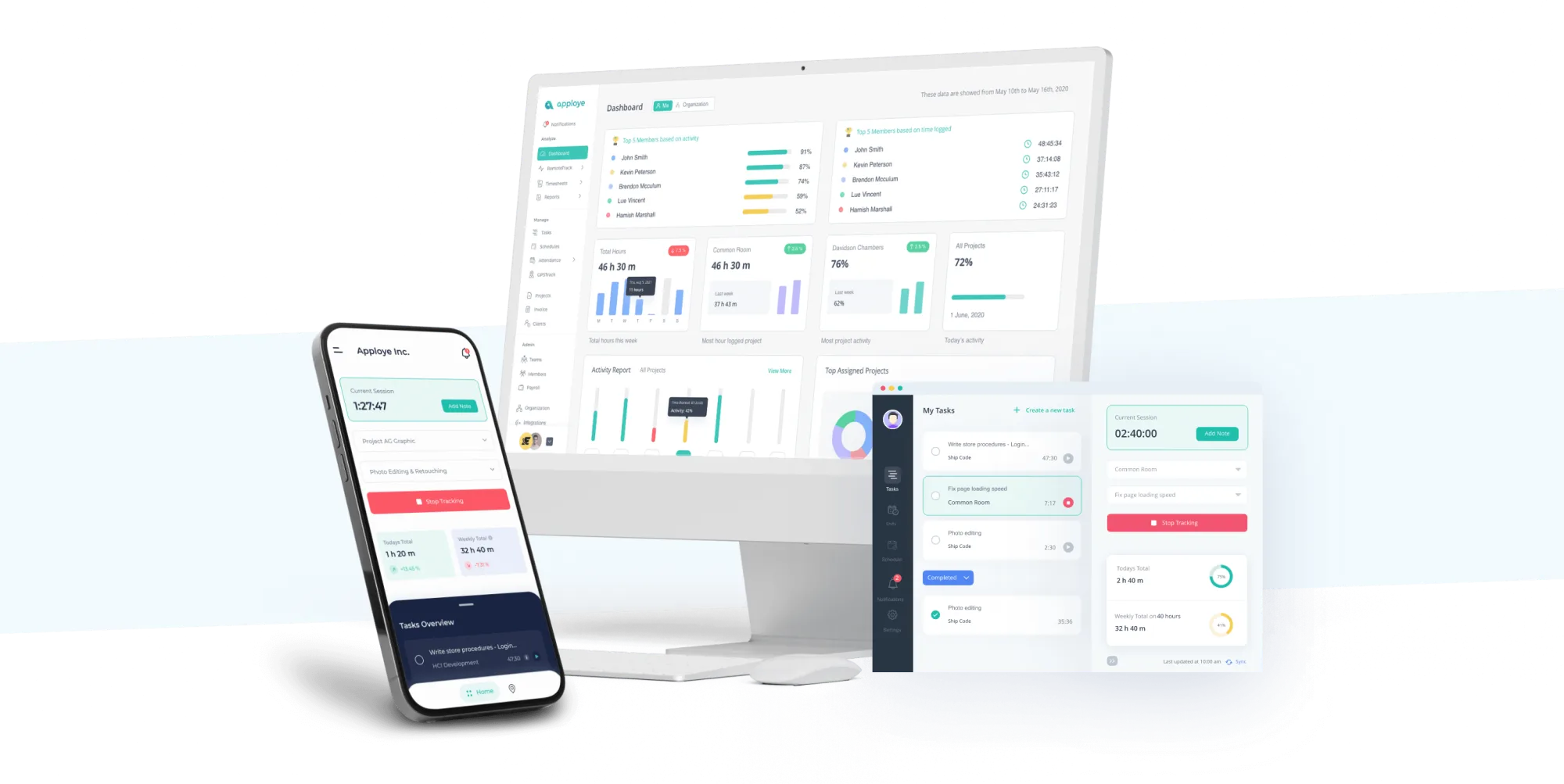Employee Social Media Monitoring: Legality, Ethics, and Best Practices!

Key Summary:
-
Social media monitoring is tracking the online activity and content to understand employee behavior, focusing on work-related activities.
-
Employers can monitor social media, but must follow privacy laws.
-
For fairness and trust, transparency, clear policies, and compliance with the laws are a must.
Considering social media monitoring for your employees? Not so sure where and how to start?
I understand it must be difficult to ensure effective employee monitoring without infringing on privacy. But with a clear understanding of it, you can get both with little effort.
In this article:
- What is employee social media monitoring?
- Is it legal to monitor social media?
- Why should employers consider social media monitoring?
- Is social media monitoring ethically justified?
- Best practices for monitoring employees’ social media
I’ll get into every nook and corner of social media monitoring and show you how you can utilize it.
What is Social Media Monitoring of Employees?
Employee social media monitoring is the process of tracking the online activities of employees and their social media usage. It ensures employees remain focused during work hours. Moreover, it minimizes the time spent on non-work-related activities.
Through workplace oversight and online activity monitoring, companies assess posts and interactions. They use employee time tracking to ensure workplace policies are followed.
Digital footprint analysis allows businesses to identify potential security threats and protect the company's reputation.
While monitoring various social media platforms, organizations can detect patterns that might indicate disengagement or policy violations.
Can Employers Monitor Employees' Social Media? Is It Legal?

Let’s be honest here: there are no federal digital media monitoring laws that prohibit employers from tracking their employees' social media.
They can monitor employees, but they must also respect employee rights and company policies.
Moreover, the business must follow the regional or relevant privacy laws like GDPR (General Data Protection Regulation) and ECPA (Electronic Communications Privacy Act).
Although no federal laws prohibit such monitoring, state laws may differ. For instance, a Scottish tribunal ruled that workers' WhatsApp group chats aren't private.
It allows employers to discipline staff for inappropriate content.
On a similar note, while the First Amendment protects free speech on social media, it can differ between public and private sector employees.
Public sector employees are protected under the First Amendment. However, private-sector employees do not have the same constitutional rights at work.
Still, both sectors should implement social media policies to reduce the risks of litigation and to ensure legal social media surveillance.
These policies must not restrict activities protected under the National Labor Relations Act (NLRA).
Plus, the National Labor Relations Board has made it clear that discussions among employees regarding working conditions — even negatively —are considered protected speech.
These communications are classified as "concerted activities" under NLRB law. A balanced approach to monitoring group activity on social media helps maintain employee rights while protecting organizational interests.
“Businesses must balance monitoring objectives with employees’ right to privacy, making it essential to stay within legal limits to avoid potential claims of invasion of privacy.”
Managing partner at Koenigsberg & Associates
Why Employers Consider Social Media Monitoring?
Social media has become an embedded part of your daily life in this digital society.
I’ve noticed some organizations don’t mind occasional brain breaks at all.
However, problems arise when employees start using work hours and company resources for social media activity. In this case, appropriate social media use policies can help set clear boundaries while still allowing reasonable personal usage.
Moreover, social media misuse at work has potential security threats, such as sharing private corporate information, data breaches, or posting harmful content.
Organizations must be vigilant about data breaches that might occur through careless social media sharing.
When employees choose work devices for social media, it can alter the conversations they have online. Ultimately, it enhances the potential impact of their online actions.
For these reasons, employers prefer monitoring social media in the workplace to stay ahead of the curve, ensure workplace risk management, and enforce employee monitoring software.
- Social media monitoring helps users stay informed about online behavior by tracking activities like new comments, post edits, and new posts.
- It ensures that intellectual information or sensitive data isn’t leaked online for Company Image Protection.
- It can identify the signs of disgruntlement that potentially increase the employee’s insider security risk score.
- Businesses can ensure that social media is not being used for abusive behavior and time wasting during work hours.
- Some employers also track chat collaborations. It helps them to identify who quietly supports their coworkers. Monitoring various communication channels provides insights into workplace dynamics and potential issues before they escalate.
What Can Employers Legally Monitor On Social Media?
Here are the main concerns: What specific aspect can employers legally monitor on social media for fair game?
Below, I’ve outlined the key areas of Social Media Monitoring by employers.
- Social Media Public Profiles Only
An employer can monitor publicly available data like open social media content. You should not try to monitor the content that requires an access request.
- Content Related to The Company or Job
Employers have the right to monitor staff social media activity and the content that are related to their brand reputation management.
For instance, comments on work performance or the client relationship.
- Social Media Activity That Violates Company Culture
You can track social media post that violates workplace ethics and HR policy. For instance, employee misconduct and sharing confidential information. Posts that contradict company values can potentially damage organizational reputation and morale.
- Work-Related Communication
As an employer, you can also monitor internal communication and group activity, even if it occurs through private social media communication channels.
Of course, it should be done for the company's sake.
- Employee's Public Advocacy or Online Reputation
You can check the public online activities of the employees if they affect the reputation of the company.
You might be interested:
12 Common Time Wasters in the Workplace
Is Social Media Monitoring Ethically Justified?

Well, as you see, mostly, you can monitor your employees' social media and internet usage during work hours. But the question remains, will it be ethical?
Actually, employee social web monitoring raises complex ethical questions. That’s especially true regarding employee privacy concerns, data usage, and freedom of expression.
True that it can bring several benefits to the company or businesses. But this monitoring can be ethically justified only when it is done transparently and with the clear consent of the employees.
Providing fair warning to employees about monitoring practices is essential for maintaining trust and transparency.
“If a company doesn’t extend trust to their people, [the employees] lose their sense of autonomy and start to underperform,”
Founder of Hare Hires.
As Krista Hare said, trust has a major impact on how your employees will perform.
So, you need to ensure that monitoring is limited only to business-related reasons to maintain trust.
Of course, then, you will have to put in a lot of work to make the monitoring beneficial for everyone.
From what I’ve learned during these many years, social media surveillance ethics totally depend on how you use it and, more importantly, how transparent you are with your team.
The best workplace ethics is where your intentions for monitoring are well aware and well communicated.
Organizations that prioritize a positive company culture find that transparent monitoring practices align with their values and actually enhance employee trust.
Ethical Employee Social Media Monitoring Best Practices
As you see, social media monitoring is a sensitive matter that involves both legal and ethical aspects.
With so many advantages of fair monitoring practices, I know you must be feeling pressure about how to do that ethically.
You can follow the steps.

1. Monitor Social Media Activity and Internet Usage During Work Hours
Well, as you see, monitoring employee social media activity and internet usage is reasonable.
But as long as it is limited to work hours and done respectfully. Here, your goal should be just to ensure company time is used productively.
You should keep focus on identifying excessive time wasting on non-work-related sites, website visits, and usage that hurt productivity. Like facebook, twitter, or youtube.
Determine what should be monitored—and when. A fair approach is limiting monitoring to work hours, focused on company-owned devices or networks.
2. Create Official Company Policies
When you want to implement ethical social media monitoring, you must ensure that your employees never feel that they are being monitored secretly.
You should communicate very clearly with them about monitoring, including the ‘What’, ‘Why’, and ‘How’.
Create a clear and transparent workplace social media policy, following HR standards that employees should be aware of.
Be Specific About Dos And Don’ts
Set clear guidelines on what will be acceptable and what will not. You should define how your employees should engage in social media relating to the company matters.
It will ensure that they represent your business professionally and also maintain their online freedom.
Protect Proprietary Information
Ensure that your employees understand the importance of protecting the business information.
Your policy should focus on keeping the business's private information and the company's ideas safe from leaks. Consistent monitoring can identify potential security risk factors before they become serious issues.
Comply With State And Federal Laws
You must know and comply with the state and federal laws to ensure ethical monitoring practices.
Here, your company policy should prioritize employee rights and, at the same time, protect your company's interests. Following industry regulations is crucial for avoiding legal penalties while maintaining effective monitoring practices.
Further read:
Employee Monitoring Laws Explained: Federal vs. State
Educate And Enforce
Just creating an effective policy isn’t enough, it demands employee awareness.
I generally recommend having regular training sessions to educate employees on social media best practices and your company policies.
3. Provide Productivity Insights
Some businesses may think, why not ban social media in the workplace?
But you know, completely banning social media can backfire. It can even break labor laws if you stop employees from discussing work conditions.
So, instead of blocking access, you should implement monitoring tools to help the employees better manage their time.
CTA: Get Apploye for effective employee time tracking!
4. Track Time, Not Personal Activity

You, as an employer, should have a work-hour analysis for ethical employee tracking.
You should track employee user activity and how much time they are spending on non-work related activities instead of checking their social media posts or emails. It will be illegal monitoring.
Ethical productivity monitoring just focuses on productivity, not privacy.
5. Use Smart Alerts for Inactivity
We may have all experienced this, but sometimes we unintentionally lose track of time when scrolling social media.
To enhance workplace productivity, I prefer to use inactivity alerts instead of surveillance-based software.
These monitoring policies work as a gentle reminder to not feel like punishment. It helps the employees to stay focused on work without being pressured.
6. Focus on Accountability
The idea is that social media monitoring encourages responsible use of social media during work hours and a positive work culture. It is not meant to instill fear.
Better than penalizing occasional use, you should use performance-based management to help the employees enhance their time management skills.
As I have seen, when employees find that monitoring is being applied just to enhance their productivity, they more willingly take accountability for their professional responsibilities.
7. Use Ethical Monitoring Tools
Last but not least, compliance-friendly software to ensure fair HR practices. Not all best employee monitoring tools are created equal.
You should choose software that provides you with insights into how the employees are spending their time.
The tool monitors productivity, not personal information. It should keep the social medical tracking work-related without being intrusive.
8. Integrate Monitoring with Existing Work Tools
Of course, social media monitoring platforms can be very effective in tracking daily workflows.
However, I always suggest that businesses should integrate it with other business intelligence tools.
It can be project management software, business communication apps, company computers, or any other tool that your business uses.
With this, it will be easier for you to track product and workflow automation without any unnecessary steps.
This approach will enhance the efficiency without making the monitoring more obvious, feeling like they’re under constant surveillance by the employees.
Proper monitoring of electronic communications provides valuable insights while maintaining employee dignity and privacy.
Monitoring Employee Social Media Activity in Event-Related Situations
With the rise of social media usage, sharing every moment has become more likely a trend.
Sometimes, it becomes a matter of concern for employers when personal posts may blur the lines of professionalism.
Actually, in some cases, you can monitor individual posts for specific reasons.
For instance, if you suspect that the employer has violated their contractual obligations, they may investigate further.
In such cases, viewing the individual posts is generally allowed and permissible under Article 6(1) of the GDPR.
That’s because it is more likely to be in the employer's legitimate interest. After reviewing the posts, you can take possible action, like issuing a warning or, in extreme cases, terminating the employee.
It is also worth noting that the assessment expressed in article 9(2)(e) of the GDPR clarified that the legislator does not consider social media posts as private as other personal information.
That means the law doesn’t give extra protection to these posts.
You, as an employer, don’t have to handle social media incident responses with the same level of privacy as other personal data.
The Risks Of Improper Social Media Monitoring
There are also some risks associated with poor or improper social media monitoring. It can lead to several consequences. For instance,
- It can lead to legal actions that can damage the employer-employee relationship.
- Excessive monitoring affects the company's reputation.
- Violation of the privacy laws can result in government penalties or costly lawsuits.
- Excessive monitoring damages the trust between the employer and the employee.
- Employees may respond through whistleblowing or public complaints.
- Inconsistent monitoring practices can lead to confusion and resentment.
- Discourages the employees to express themselves freely.
- Monitoring can waste time and company resources if not done properly.
Tools for Monitor Social Media Activity of Employees
With so many options and advice floating around, it can be hard to choose the best one for employee social media tracking software that is worth trying.
To save you from all the hassle, I’ve recommended three social media tracking platforms for your workplace.
Apploye
My first recommendation is Apploye. It’s an all-in-one time tracker with screenshots. Also, it allows you to record your screens and activities.
You can effortlessly track your employee productivity, including employee activity tracking during work hours for both on-premise and remote employees.
And based on that, you can find out activity levels, check real-time feed, screenshots, and so on. It’ll help you figure out the productivity and monitoring both at once.
Hootsuite
Hootsuite is a social media management platform used for social media monitoring by many businesses.
It allows you to track mentions, keywords, and hashtags related to the brand.
Moreover, it can effectively track activity on different social media platforms like Facebook, Instagram, Twitter, LinkedIn, and others.
Sprout Social
Sprout Social is another comprehensive social media monitoring solution.
It lets you track engagement, manage publishing schedules, measure analytics, and perform social listening.
Final Words
All in all, to maintain professionalism and trust at work, you must conduct social media monitoring legally and ethically.
Ensure your employees’ privacy is being respected and that the legal guidelines are being followed.
Be transparent and set clear rules. You can also use software to monitor working from home employee activity, like Apploye. It can help you ensure effective and fair social media monitoring.
FAQs
What is the difference between social media monitoring and listening?
Social media monitoring tracks mentions and engagement. Digital listening analyzes trends and sentiments. However, both are essential for social media analytics and online reputation management. They help businesses understand audience behavior and enhance strategies.
What is the main form of social media monitoring?
Social media monitoring includes tracking the brand's mentions and analyzing engagement. Here, HR data analysis helps to monitor workplace discussions. It ensures compliance and protects the company's reputation.
How does social media monitoring work?
Social media monitoring uses online surveillance methods to track mentions, trends, and interactions. The business also monitors the digital footprint of its employees. They also use social media compliance tools to ensure the security of the brand and compliance with industry regulations.

